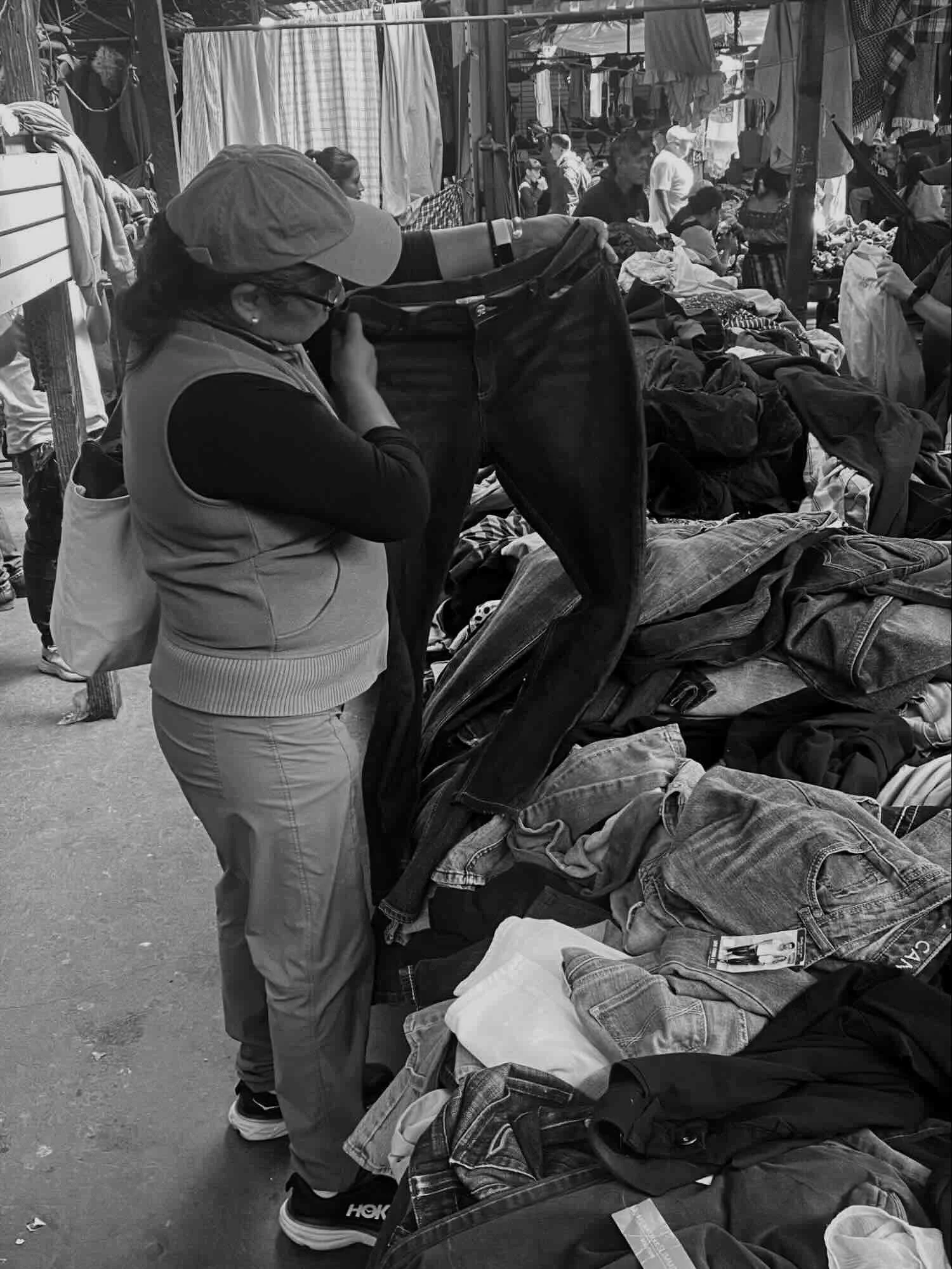Featured in “Revitalizing Indigenous Craftsmanship: AlterNatives™ Solution to the Hidden Cost of Secondhand Fashion in Guatemala”
Guadalupe Ramírez (Sourcing Material)
A trend where developed nations frame the export of secondhand clothing to developing countries as a sustainable (and perhaps charitable) act has been ongoing for decades. The idea is to send garments to communities in need to provide them with affordable clothing while reducing waste instead of piling them in landfills. Guadalupe Ramírez, founder of the Asociación de Mujeres del Altiplano (AMA) and co-founder of the Highland Support Project (HSP), has seen its impact in Guatemala. She argues that, albeit positive in theory, it poses unintended pitfalls that threaten the livelihoods and traditions of indigenous artisans.
The United States is a significant exporter of used textiles, accounting for more than 40% of global used clothing exports annually. Africa receives most of these. Countries in the eastern part of the continent believed this trend undermined their initiatives to build domestic textile industries and even imposed a ban on them. Ramírez states that in countries like Guatemala, the overwhelming amounts of discarded Western fashion saturate local markets, disabling traditional artisans from competing.
Guatemalan tailors, experts in creating handmade garments, have to work as repairmen to adjust the fit of Western cast-offs instead of creating original pieces. What does this instance entail? Generations-old skills fade, and the people are forced to depend on external goods, eroding cultural identity. Indigenous women who held economic agency through textile production were also disempowered. These women inherited their markets and craft skills from previous generations. Lamentably, globalization has stripped them of this autonomy and pushed them into low-paying wage labor.
Ramírez adds that another problem is that the garments of little use to the local population are discarded in the streets, degrading the environment. There are reports about developing countries receiving secondhand clothes that are mostly of low quality and can’t be resold. Such instances present environmental and economic consequences for recipients.
Ramírez founded AlterNatives™, a community brand under AMA, to revitalize indigenous textile traditions and provide artisans with sustainable economic opportunities. This project began over three decades ago as a small initiative to help widows sell their weavings locally and at church bazaars in the US. It then grew into an international brand that supports hundreds of indigenous women across Guatemala.
AlterNatives™ connects artisans with consumers, bypassing exploitative supply chains and ensuring fair wages. Women from AMA’s circles are skilled in embroidery, tailoring, leatherworking, and jewelry-making. They craft high-quality, handmade products that blend tradition with contemporary fashion. The process is simple. Artisans receive orders and produce their goods, and AMA facilitates the sale.
AlterNatives™, thriving in collaboration, ensures that profits go directly to the people who create them. “Our artisans share how they use their earnings to improve their families’ living conditions. Some of them invested in the education of their children. Others started new businesses. Knowing these stories warms our hearts and gives us strength to continue what we do,” Ramírez remarks.
Besides empowering women to achieve financial stability, AlterNatives™ helps tackle the issues created by the influx of secondhand clothing in Guatemala. It promotes upcycling, allowing artisans to turn discarded fabrics into new, high-quality products. Ramírez shares an example: “Denim pants are sold cheaply here because they’re too big for our local population. What we do is repurpose them into stylish and durable bags and accessories. We also don’t throw away garments that have minor damage because we can creatively rework them.” Overall, this approach reduces waste, preserves cultural heritage, and empowers artisans, hitting not only two birds but three.
AlterNatives™’s reputation has expanded globally. Its products are available online and throughPIXAN, a fair trade retail store in Richmond, Virginia. “We’ve come a long way. We’ve greatly improved our capacity over the years, and I believe that our clients, especially the women, see themselves reflected in our story,” Ramírez says.
The brand’s product line attests to the artisans’ craftsmanship and cultural heritage. PIXAN offers home décor items, face masks, and accessories such as tote bags, pouches, scarves, and handwoven rugs. The fabrics are created using two traditional weaving techniques, namely, the foot loom and the backstrap loom.
PIXAN had an opportunity to showcase the collection Ramírez designed at New York Fashion Week (NYFW) Amor for Upcycling, a sustainable fashion event reimagining waste into wearable art. The upcycled collection was a statement on how beauty and value can be found in what society discards.
Ramírez shares that this is a milestone for PIXAN as it highlights the brand’s growing recognition in the global fashion scene. She aims to further expand PIXAN’s presence online and in international markets. The brand is currently working on enhancing its e-commerce platform to make this possible. Meanwhile, Ramírez focuses on expanding its reputation by participating in shows, with plans to debut a new line that fuses Asian aesthetics with upcycling and traditional fabrics.
Still, AlterNatives™’s primary mission is to provide sustainable income opportunities for artisans in Guatemala. It intends to continue empowering indigenous women to achieve economic stability and reclaim the dignity of traditional craftsmanship amid globalization.
Amore for Upcycling at New York Fashion Week | Credits to: Jordan Tyler


